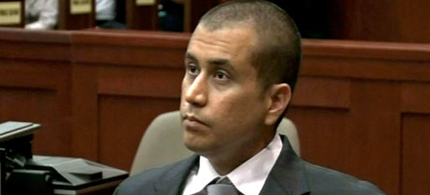
Zimmerman's Bail Set at $150,000 in Martin Shooting
Serge Kovaleski, Jennifer Preston, The New York Times
 Florida judge on Friday set George Zimmerman's bail at $150,000 in the shooting death of 17-year-old Trayvon Martin and imposed restrictions on Mr. Zimmerman's release from jail.
Florida judge on Friday set George Zimmerman's bail at $150,000 in the shooting death of 17-year-old Trayvon Martin and imposed restrictions on Mr. Zimmerman's release from jail.
During the more than two-hour bail hearing, Mr. Zimmerman, a neighborhood watch volunteer who has been charged with second-degree murder, briefly took the stand and offered an apology to the victim's parents, who were in the courtroom.
"I wanted to say I am sorry for the loss of your son," Mr. Zimmerman, 28, said, speaking publicly for the first time about the Feb. 26 shooting. "I did not know how old he was. I thought he was a little bit younger than I am. I did not know if he was armed or not."
Mr. Martin's parents, Tracy Martin and Sybrina Fulton, sitting in the second row of the small courtroom, showed little emotion during Mr. Zimmerman's remarks. They did not comment after the hearing ended, hurrying to a waiting car.
According to their lawyer, Benjamin Crump, Mr. Martin's family was "completely devastated" by the judge's decision that Mr. Zimmerman could be freed on such a low bail. He also described Mr. Zimmerman's apology from the stand as "self-serving" and said he considered it a ploy to help win his release from jail.

George Zimmerman in court. (photo: Reuters)
In setting bail, the judge, Kenneth R. Lester Jr., said that Mr. Zimmerman could have no contact with Mr. Martin's family and no access to alcohol or firearms and that his movements would be monitored electronically. Judge Lester also set a curfew that would require Mr. Zimmerman to remain at home from 7 p.m. until 6 a.m. and require him check in with the authorities every three days.
Mr. Zimmerman would not be released from jail for several days, according to his lawyer, Mark O'Mara, because it would take time to put in place the electronic monitoring required by the court and to find a secure location for Mr. Zimmerman, who has received death threats.
Mr. Zimmerman's family members testified that they would assume responsibility for his whereabouts when he is released from jail.
Testifying by telephone, Mr. Zimmerman's wife, Shellie Nichole Zimmerman, said that she would also notify the court and law enforcement officials if she lost contact with Mr. Zimmerman for any reason before his trial.
Judge Lester had agreed to allow Ms. Zimmerman and other members of the Zimmerman family, including his father, Robert, and his mother, Gladys, to testify at the hearing by telephone out of concern for their safety.
Mr. Zimmerman, who spoke in a soft, low voice when he took the stand, was dressed in a white shirt, dark suit and gray tie. He was shackled at the waist and legs and wore a somber expression during the proceedings as he sat next to his lawyer. .
He showed no expression as his wife calmly answered questions from both Mr. O'Mara and Bernado De La Rionada, an assistant state attorney.
Ms. Zimmerman said she and her husband had been married for almost five years and that she did not believe that he posed a flight risk. She said she spoke with him every day by phone when he was in hiding in the weeks before his arrest.
Mr. De La Rionada asked her whether she believed her husband was a violent person. She replied, "No."
"He is absolutely not a violent person," she said.
Mr. Zimmerman has spent nine days in the Seminole County jail since his arrest, which came six weeks after he shot and killed Mr. Martin, 17, who was unarmed and walking through a small gated development in Sanford. Mr. Zimmerman told police he shot Mr. Martin in self-defense.
The case, which led to protests and marches around the country, raised questions about Florida's expansive self-defense law and racial profiling after Mr. Zimmerman was not immediately arrested after the shooting on Feb. 26 and remained free for weeks. Widely criticized for not moving quickly enough on the case, both the Sanford police chief and the local prosecutor stepped aside.
Gov. Rick Scott appointed Angela B. Corey, a state attorney from the Jacksonville area, as a special prosecutor to manage the case. Ms. Corey brought the maximum possible charge against Mr. Zimmerman, outlining in court papers that he had profiled Mr. Martin based on his race before following him as he walked through the development.
If convicted of second-degree murder, Mr. Zimmerman, could face life in prison.
